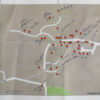If I spotted a book with the title Zombie Cat Plague, would I check it out? Possibly, but that’s only because cats are badass at the best of time, so the prospect of zombie ones is truly frightening. This isn’t about Zombie Cat Plague though. As far as I know, there isn’t a book with that title. Hmm, strokes chin, maybe there’s an opening there. It is about book titles and whether it is essential they give potential buyers a clue as to what a book is about.
In a recent online workshop with a literary agent and an author of crime fiction, I asked how important they thought this was. The reply was that it was better if titles piqued the curiosity, drawing readers in by giving a sense of what lies within the pages. On the face of it, this seems like common sense.
Yet it doesn’t apply to most of the books I read. The novel I was reading at the time of this session was Yellowface. What does that suggest? That it concerns someone with a yellow face? Only in a satirical way. It’s an appropriate title for the story, but it doesn’t really tell you much about what that story is, not in the way Zombie Cat Plague might. The novel I read prior to that was The Bee Sting. Sure, there is a bee sting in the book but, again, it tells readers nothing about the plot. Other recent novels I’ve read include Orbital (not a reference to a techno band from the 80s & 90s), Julia (could be about anyone called Julia), Butter (butter does play an important part), and The Sea (there’s an ocean of scope with that one). None of those titles reveal much. Yet among them are two Booker Prize Winners and a Booker Prize shortlisted novel. So, they were hugely successful despite their ambiguous titles.
Does that make the advice I was given wrong? Definitely not. However, neither is it completely right.
Although the writing group I’m a member of (Jericho Writers) is excellent when it comes to the craft of novel writing in general, there’s a tendency to focus on genre writing. Generally, readers of specific genres have certain expectations. Subsequently, books for these genres are often written to meet and satisfy these expectations. Part of this process involves having titles that give a big hint to readers what may lie ahead.
I tested this by scanning the books on Waterstones’ current list of bestsellers to see if I could work out the genre from the title alone.
Orbital, Butter, and Yellowface appear on the list. All fall under the almost meaningless ‘literary’ books tag. Literary simply means they don’t fit neatly into a specific genre. A bestseller called Onyx Storm sounded to me like it could be a fantasy sword & slasher type affair. A look at the synopsis confirmed both dragons and magic feature. Brimstone made me think horror with a religious slant. I was wrong, it’s a romantasy. The List of Suspicious Things suggested quirky, light-hearted crime. It is crime, but maybe not as lightweight as I thought. The Wizard of the Kremlin conjured up a shady figure behind the scenes of Russian politics, a Rasputin type pulling the strings. It is a fictionalised account of Putin’s chief spin doctor. And then there was Richard Osman’s We Solve Murders, a perfect example of a title telling readers exactly what they’re getting.
It’s hardly a definitive analysis, but it did sort of back up the established practice in novel writing of genre books having titles that give an indication of the content. On the other hand, non-specific genre novels have more of a free reign when it comes to titles. As a result, they can be more obscure.
As a reader for whom genre isn’t a key factor whether I buy or not, titles don’t mean a lot. I appreciate clever ones, but the title is never going to be the deciding factor that persuades me to buy or not buy a book.
On the other hand, from a writing point of view, it’s something I can’t ignore. Titles are important to some. Maybe compromise is the answer. If I did write a book about undead felines terrorising the neighbourhood, instead of it being Zombie Cat Plague I could call it something less obvious, maybe something like Pause in the Night. A title like that could work on a couple of levels (and no, that is not a typo). Trouble is, it probably wouldn’t hook the genre readers, and those expecting something meatier and deeper could be horrified to find themselves reading a trashy tale of scabby cats wreaking devastation.
Basically, it is horses for courses. Which is a way of me justifying why I’m choosing to ignore the advice of the crime writer and literary agent and sticking with a title for the novel I’m working on which doesn’t spell out what the book is about














